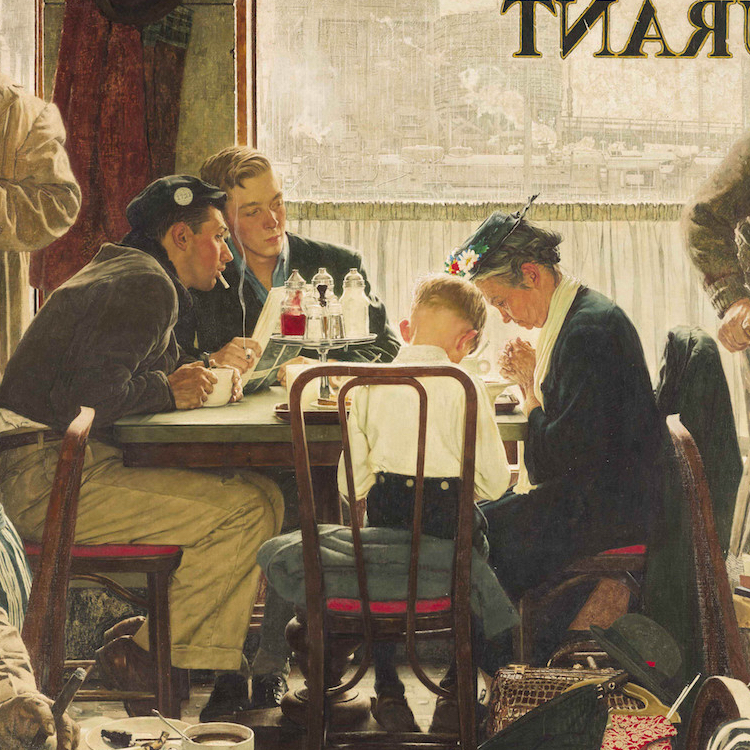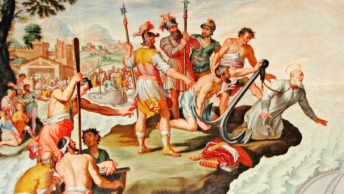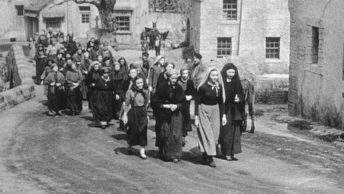I must confess that saying grace before meals was never a common practice for me as a child or even while my wife and I raised our three children. Grace was something reserved for Christmas, Easter and family celebrations at home. My failure to make it a habit has resulted in some embarrassing moments. When breaking bread with the tallest deacon in the St. Louis Archdiocese, the late Hall of Fame basketball player, Ed Macauley some years ago, I had a mouthful of tuna salad when Easy Ed lowered his head and started to pray.
Another time at lunch my oldest child, Mark surprised me when he bowed his head just as I started to bite into my tuna sandwich. It was not quite the old adage of the son being father to the man but it did strike home. His wife is a convert and she has always impressed me with her moving extemporaneous prayers before our family gatherings. The few times I dared to emulate her resulted in nothing better than the perfunctory Bless us O Lord… As an aside, it has taken years of extemporaneous practice for me to finally reach a stage where I think I am in Patti’s league.
While saying grace is a small thing in the overall religious scope of things, I am proud of my son and my daughter-in-law for setting me such a good example. While the Biblical story of the Publican and Pharisee warn against making little things the center of our faith, in this case the exact opposite ring true. My father used to lecture me on not being wasteful, whether it was two minutes of electricity or throwing away perfectly good scrap paper. He also said if I took care of the cents the dollars will take care of themselves. If more Catholics took care of the little acts of devotion like saying grace and saying the rosary I doubt we would have to worry so much about following the Church teachings on some more serious subjects like abortion, euthanasia or embryonic stem cell research.
On her deathbed St. Therese of Lisieux worried that the other members of her order would grieve too much over her death. She believed that everything is grace, one’s death. She instructed her caregivers to treat her dying as a gift from God, that is another moment of grace in their lives. A Catholic columnist echoed her sentiments when he asked, why stop with grace before meals? He suggested that we say grace before every activity that we perform and take advantage of an unlimited number of opportunities for opening our hearts and maybe those of others to the Divine Will of God.
This is a profound idea that reminded me of my orientation for the Catholic Lay Extension Volunteers in 1965 at Barat College in Chicago. One day we attended a lecture by Sister Charles Borromeo. She taught us about the 8th Sacrament. Consistent with Church teaching, she defined a sacrament as a visible sign instituted by Christ to give grace. She said that the 8th sacrament was the human person and it was the only sacrament that everyone in the world could receive, no matter if they were Catholic.
As far out as that may sound, after all it was the 60s, she made an interesting point. I believe she anticipated the columnist who advised seeing everything as an opportunity for grace. This revolutionary idea can literally sanctify every moment of our lives. It can also force us to focus on how our actions and our words affect other people. No action or word is ever neutral. They either push us closer to our divine destination or lead us away from God.
There is also such a thing as satanic grace. We can lead others astray by scandal or by enabling them to rationalize their bad behavior. That is why it is so important that Catholics stand up for the truth of the faith at all times. All this should leave us with the new challenge to bless us oh Lord before all our daily activities, not just a tuna salad lunch. Then everything we do and everyone we meet will be another gift of grace from God.








